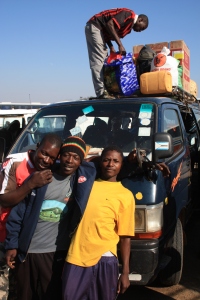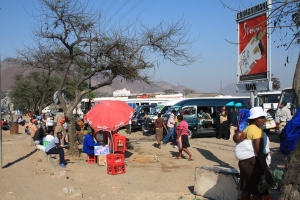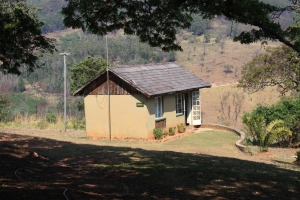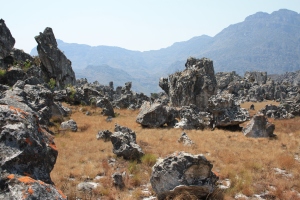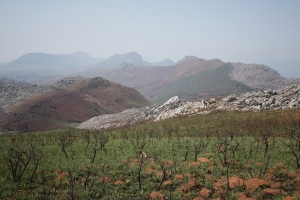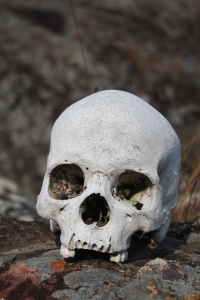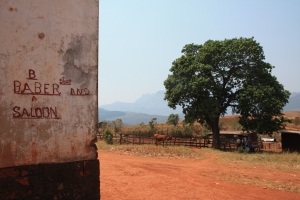Home » Posts tagged 'Robert Mugabe'
Tag Archives: Robert Mugabe
Chimanimani Gold Rush
I have yet to make a reservation over 24 hours in advance for anything in Africa. Most of Nicaragua and China was the same, granting me the flexibility to go where I want, when I want. This flexibility, I quickly learned, is one of the top benefits of traveling solo- hostels usually have at least one dorm bed left, and other companies tend to be able to squeeze in one more customer.
The reason I left so much time for Africa is that I felt I didn’t have enough time to visit the first two countries this year. I wanted to be able to include destinations recommended by other backpackers, yet hop off the tourist trail whenever possible. Therefore, in late September, I found myself trekking through Chimanimani National Park, located in the Eastern Highlands of Zimbabwe.
—
The night before departing for Zimbabwe, with the plan to bolt straight through to Victoria Falls, I met a 24 year-old German guy at the hostel nearest to the border. I had just finished a long day of hitching from the south of Mozambique and desperately wanted to sleep, but I overheard him explaining his route to another backpacker. Unsure of the costs and time required to make it to Zimbabwe, I ventured over to his table. Soon after, the man with the yard-long dreadlocks convinced me to spend a few days in the Highlands before moving on.
After obtaining a $30 tourist visa from the unorganized immigration office at the border, I crammed into an old junker of a taxi. With the temperature hovering near 100º F, I was thrilled when we finally filled up the red car. My window couldn’t roll down and there was no door handle, so I was sweating hard after 20 minutes. Unfortunately, these taxi drivers have taken a note out of the minibus drivers’ book, and they cram as many people as possible into the car. I was already squished next to an obese man, so I assumed the driver was joking when he ushered two rather large women to the car. Sure enough, the car fit them both. One sat halfway on my neighbor’s lap, and the other rested on the parking brake in the middle area of the car’s front half. Their luggage was piled on my lap, as the trunk was already full. The driver took a couple minutes to joke with his competitors before leaving, and the temperature inside the car crept up. When we finally began to drive, the airflow from the front window felt heavenly.
After spending a night in Mutare, where the taxi dropped us off, I took a minibus south to Chimanimani. I instantly recognized why the German suggested this place. Surrounded by mountains, the guesthouse was actually a family’s converted farm. Nestled a kilometer away from the village of maybe 200 residents, the only noise one hears is the farm animals. I first met the caretaker, Michael, and he gave me a visitor book to fill out and read. They sell 1L of milk for $1.75 and fresh eggs are also for sale. I suddenly felt extremely relaxed, even after a tough 3 day commute. The farm cat rubbed up against my leg as I sat peacefully on the couch, and I contemplated my luck to have met the German guy. I removed my shoes and socks to lay down, but the stench was too great, so I tossed them outside before retiring for a nap.
After waking and realizing that I was the only person in the guesthouse, I headed into the village to find some food. The village consists of a handful of shops selling various items, and they all seemed to be closed. I could hear music coming from behind the shops, so I continued along the orange-brownish dirt road to the back. There I found a couple wooden stands selling produce and food, as well as a bar. I realized that the majority of those in the village center were drunk, including the shop owners, and had to ignore several calls for my attention. I was famished, so I ordered a big plate of beef stew and pap, a traditional African dish. The flavorless pap tends to fill one up quick, and from my experience, makes up about 75% of villagers diets. A scruffy-looking man asked me to pay $2 instead of $1, so he can have a plate too, but I declined. I don’t support begging, and never will, unless the person is handicapped and thus unfit for work. To be fair, one could argue that the Zimbabwe president Robert Mugabe has single-handedly handicapped the entire nation, but that’s a story for later.
The food was easily the saltiest I’ve ever had, and that includes the time in Nicaragua when the salt cap fell off, covering my chicken in sodium. The pap had definitely been sitting in the pot all day, and possibly the day before as well. Regardless, I was full, and it was time to face the drunken “army” men. They asked questions, begged to marry my sister (even though she’s 10 years-old), and professed their love for Obama. Before I departed they had me take a picture of them, for which they stopped smiling, and then informed me the picture would cost 4 beers. I had failed to remember to withdraw money in Mutare, so I was working with limited funds over the following three days ($30), so even if I wanted to drop $2.50 and have a beer with them, I couldn’t. On my way out they told me to bring my sister next time, so she can meet a strong army man to wed.
In the evening, I met Alex, who would accompany me as a guide through the park for two days. I had planned to hike alone, but he did an excellent sell job, and was able to find someone to convert my useless $17 worth of Mozambican Meticais, which would serve as his pay (plus $3). To be honest, I did not feel completely comfortable trekking the mountains alone, and was happy to enlist some company. Alex gave me a rundown of the total costs of entry, and I realized I still would not have enough. Therefore, he helped me move my bags and tent to a cheaper, unfinished guesthouse for the night. Even with the move, I would be left with $1 for a bus ride to the middle of the country and all food expenses. The latter would not be a problem, as I had 2kg of rice, 15 tomatoes, half a loaf of bread, and instant soup broth- plenty to last three days.
On the morning of the 25, two days before my 22nd birthday, Alex and I took our hired ride to the park entrance. Alex was still wearing the Cincinnati Bearcats shirt I met him in yesterday, as well as the Guinness cap. He had no clue what Guinness is, or where Cincinnati is located, as his apparel had all been donated. His faded blue jeans seemed in good condition, and for the first few hours, I thought his fake New Balance shoes were the real deal. As we exited the car, I told him I envied his facial hair- his thick goatee puts my blonde, practically invisible peach fuzz to shame. He released a hearty laugh, and we entered the park reception office.
Once we paid, I realized that Alex was working for under $5/day- and he still had to pay $1 each way from his village, which was an hour away from my guesthouse. Throughout the first day, I slowly learned about Alex’s ideal occupation. According to him, guides on the overland trucks make a killing. For eight to ten months of work, they have no expenses and receive about $2000. Even though he would be forced to leave his family, the funds would allow him to provide a better life for his wife and child, and make things a lot easier on him. Think about that for a minute. His lifelong dream job pays $2000/year! These people have such little opportunity that $2000 seems like a killing, an amount to dream about. Meanwhile I’m listening, recalling the times when I was a bit disappointed I didn’t hit the $100K mark for my first job. Alex isn’t alone, though. Many of the people I met seemed to think myself and other travelers are ridiculously wealthy. Backpackers are always frustrated about that, because in our eyes, we are poor, budget travelers. In discussions with locals about wealth, they did indeed lump backpackers and high-end tourists together. Yet their assumptions about salaries and disposable income for both types of travelers were lower than the acceptable minimum wage in the US. They think we’re rolling in money, but in reality, can’t wrap their mind around the amounts we actually do make.
For much of the next two days, I tried to hash out a plan with Alex that would help him realize his goal. To me, obtaining such a job seemed easy. I would figure out who recruits for the companies, who is in charge, and try to make a personal contact with a guide from each company. Soon enough, the job would be mine. Unfortunately, even though Alex felt optimistic about his chances after our discussion, I didn’t. He doesn’t have access to a computer regularly, and has to travel hours into town to pay for access to one. To make matters worse, ever since Mugabe crippled the country with his dictatorial style, tourists stopped coming as did the overland trucks. But even if their was a public computer in the village and overland trucks didn’t detour around Zimbabwe, the villagers’ lack of info- as showcased during the days of hyperinflation- would still hinder them from the tourism industry and its accompanying financial benefits.
In 2009, Zimbabwe abandoned the use of the Zimbabwean Dollar. That means the $100,000,000,000,000 (100 trillion) bill that I gave my little sister for Christmas is worth absolutely nothing. Quite a contrast to Zimbabwe’s day of independence in 1980, when the Zimbabwean dollar was worth more than the US dollar. Reading transcripts from Robert Mugabe’s early speeches as president would leave one assuming his rule was short lived- that a tyrant soon took power and ran the country into the ground. Mugabe seemed to desire a fair and honest democratic government, which would move on from the racist minority that previously dominated the mineral and gem loaded country. Unfortunately, one racist government turned into another. Mugabe and his officials proved unprepared to deal with such a dynamic economy, and their corruptive greed became a serious problem. Companies and farmers disappeared, and those that remained were forced to charge more for their products and services. Inflation soon turned into hyperinflation, surpassing 230 million percent at one point. That means that what used to cost $1 now cost over $2.3 million. People had to walk around with backpacks full of money to buy a gallon of milk. It cost more money to pay for dinner before eating than after, because the cost of everything (food, labor) increased by the hour.*
Meanwhile, villagers could only receive information once a day at best. Buying a loaf of bread oftentimes made more sense in a distant village than a city. There were no banks to tell them their money was actually worth half by day’s end. Although it sounds more sustainable than the hyperinflation overwhelming cities, prices still changed, and the black market was less accessible (to change money into stable foreign currencies) in rural areas. The money Alex and other villagers had stashed in their beds became worthless, and their hope for social mobility effectively vanished.
While the nation crumbled, Mugabe forced exporting companies to pay an additional tax at government specified rates, which he in turn converted on the more lucrative black market, lining his pockets. Unsurprisingly, this tax forced companies to close up shop, further damaging the once prosperous nation. Although they now use dirty old US dollars as their primary currency, Mugabe just “won” another election, and most people remain unemployed. It’s no surprise Alex was willing to guide for so little. His savings were wiped out and the lack of tourists provided him with no bargaining power.
As Alex and I walked, I realized I was being led by a superb guide, worth well over $5/day. First off, we had some great conversation. I found myself eager to hear his stories and perceptions of the world. Secondly, there were many forks in the path where I would have had to take a wild guess as to the correct direction. With him, I could see more and refrain from worrying about where I would end up. Lastly, and perhaps the number one reason I felt more comfortable in his company, was the presence of unregistered guests in the mountains. According to the sign-in sheet, the last visitors left yesterday. Alex told a different story.
Much of the river cutting through the valley we hiked has obviously been altered by man. On several occasions, Alex pointed out spots where explosions or man-made holes were created. Given the lack of employment opportunities and lust for easy riches every man harbors, villagers from both sides of the border ventured into the mountains after hearing about its superfluous quantities of gold. For weeks at a time, gold panners would live in caves of the mountain by night, and dig for riches by day. An entire micro-economy was soon formed, as the illegal panners had basic needs unfulfilled by the mountains. Entrepreneurs from the Mozambican side turned into the real winners of this gold rush, as they carted up food to sell the panners in exchange for gold. A barber would even make his way up, giving haircuts and shaves for some flakes. Suddenly, the need to return to civilization dissipated, and without much human contact, the panners went off the deep end. You see, they saw each other as competition and therefore did not want anything to do with each other. In addition to mental illness, another likely explanation for the decrease in society-returnees is embarrassment. After telling family that they would return rich, they arrived in Chimanimani to find a less-than-superfluous amount of gold. Soon, they needed to buy food, and their reserves were nearly depleted- far from the riches they promised. Expecting to hit the jackpot any day, they continued on, and some even carried drills and explosives into the mountains. They damaged the environment in their quest, and the government tried to crack down, but they had more pressing matters (exchanging money for their own benefit), so nearly all the panners skated free.
Eventually most people realized there weren’t riches to be dug up, and the inflow to the mountains decreased significantly. Most gold panners didn’t return, even though it was a short 1-2 day walk to the nearest villages. They either couldn’t swallow their pride or died. Alex’s neighbor went into the mountains years ago. He returned only for a month after a lengthy stay, as he passed away from an unknown illness. I pressed Alex on the probable cause of his neighbor’s death, and we both came to the same conclusion. Many people near to the neighbor noticed a change in his psychological well-being, but his death seemed to have been caused by a common, usually curable illness. Unfortunately, every man has his needs, and the barber and food vendor were not the only entrepreneurs. Prostitutes made their way into the mountains for their share of gold, and once one panner became infected with HIV, they all did. Spend enough time in the mountains today, and you’ll likely find a rotting body or skeleton.
Alex insisted I not take any pictures if I saw a live panner, as they are paranoid tourists may pass them on to the authorities, who will then find, evict, and jail them. He didn’t have to tell me twice. Even though we didn’t see one, and returned safely to civilization, I felt very grateful to have Alex along as a guide. Unfortunately, I had no money to tip him for an excellent trip (tips are very much expected in Africa, but I made it clear that I wouldn’t be able to from the beginning). After he returned home, I snacked on an avocado from the farm while I polished off the last of my rice. At midnight, while waiting for my 3AM bus, I turned 22 years old, and thanked my lucky stars I was born in America.
Note: The bus driver allowed me to board the bus after I explained my situation (no cash left), as long as I paid upon arrival in Masvingo. Once there, he bought me a little Zimbabwe flag for my birthday. Regardless of what opinion regarding Zimbabwe you have developed from this article, I found it to be a wonderful country with very hospitable people. I would definitely recommend visiting, and if you want to get in touch with Alex, contact me.
*Data was collected from the following sources for this paragraph: – http://www.economist.com/news/finance-and-economics/21576665-grubby-greenbacks-dear-credit-full-shops-and-empty-factories-dollars-they – http://object.cato.org/sites/cato.org/files/pubs/pdf/dpa5.pdf
– http://news.bbc.co.uk/2/hi/7859033.stm – http://www.economist.com/node/11751346?story_id=E1_TTSVTPQG
Please note that I have changed my guide’s name to Alex for this story. I did not ask permission to use his name and I’m not entirely sure the status of the government regarding freedom of speech. Although info regarding the economic and political situation was not gathered from him, I don’t want to jeopardize his safety.


